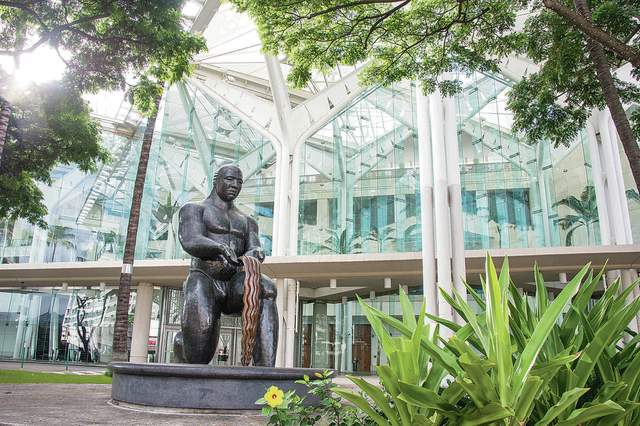Hawai’i Convention Center Expects First Profit Ever

CRAIG T. KOJIMA / CKOJIMA@STARADVERTISER.COMThe Hawai‘i Convention Center is on pace to end the year with its first profit since it was built in 1998. This statue, “The Water Giver,” by Maui artist Shige Yamada, is on the Kapiolani Boulevard side of the center.
Article originally published in Honolulu Star Advertiser. By Allison Schaefers
The Hawai‘i Convention Center is on track to achieve its first profit since opening in 1998.
Teri Orton, the convention center general manager, said the facility had $1.5 million in net income through September. Even with fourth-quarter seasonal lulls, Orton said the center should be able to hang on to a $14,000 profit.
“It’s quite a feat. It’s like turning the Titanic right side up,” Orton said.
In January state lawmakers pressured AEG and the Hawaii Tourism Authority, which oversees the center, to cut losses and retire debt. Some lawmakers were surprised to learn how high the debt was.
The building cost $350 million to construct. HTA has made $455 million in principal and interest payments but still owes $297 million. HTA is paying 6 percent interest and has restructured the debt several times, tacking on extra years and interest. The debt won’t be paid off until 2027 under the current repayment schedule.
Marc Togashi, HTA’s vice president for finance, told lawmakers earlier this year the 2016 center budget included a $2.6 million operating loss. If the facility, instead, achieves a profit, it would put it ahead of a 2018 break-even goal.
HTA and AEG have been working to increase group business. Through September the state welcomed 384,121 group arrivals — a 3 percent year-over-year improvement. Now, AEG’s challenge is to increase “citywides,” the industry term for large events that spread business across multiple venues.
“While AEG deserves credit for what they are doing, I don’t want anyone to think operating profits are the goal. Hotel room nights are what generate visitor spending and put people to work. They have got to raise the room-night bar over time,” said Keith Vieira, principal of KV & Associates, Hospitality Consulting, who previously served on the HTA board.
Orton said the convention center is within 46 percent of its year-end goal to book 225,000 future hotel room nights — the number of nights hotel rooms are booked by guests attending convention center events. She said center staff must convert another 121,440 tentative bookings into actuals. Since most signings for future events take place at year’s end, Orton said the center will offer bonuses for 2016 contracts.
“Our main purpose and goal is to bring business to our hotel partners,” she said. “Achieving our room night goal will put us 12 percent ahead of last year. We’ll keep increasing our goals.”
During the first nine months, the center hosted 142 events; it is expected to finish the year with 184 events, up from 181 events last year. The center’s food and beverage revenue hit a new high of $9.9 million through September. It’s expected to reach nearly $11.3 million by year’s end, a $2.6 million increase over its $8.6 million goal.
Through September, center occupancy was 32 percent. On average, occupancy at successful centers falls between 40 and 60 percent, Orton said.
Orton said the center hopes to draw from AEG’s expertise in entertainment and sports, she said.
She ordered $1 million in new flooring so the center can convert its 204,000-square-foot exhibition hall into courts as needed to host amateur and pro sporting events from indoor soccer to volleyball, basketball and badminton.
“We’ve already got some really good leads, including one volleyball and two basketball tournaments, and some definite business for 2017,” Orton said.
Since most large groups are booked five to 10 years out, Orton said it will take time to see the full impact of new strategies.
Jerry Gibson, area vice president for Hilton Hawaii, said the convention center’s achievements are critical to visitor industry success.
“We build our base of business off of these conventions, which help us plan for next year’s budget season,” Gibson said.
Group travelers are coveted because they tend to spend more than leisure travelers, he said. A high percentage of group travelers bring friends and family with them for pre- and post-trips and return to Hawaii for vacations, Gibson said.
“They fall in love with Hawaii and come back,” he said.
IAVM Welcomes R.V. Baugus and Meredith Merritt
 R.V. Baugus
R.V. Baugus
The International Association of Venue Managers has named R.V. Baugus as the organization’s new Senior Editor. R.V. Baugus is a communications veteran with almost 20 years’ experience covering the public assembly venue industry. R.V. is no stranger to IAVM. He worked at the association from 2000-2013 as editor of Facility Manager magazine. He started his own freelance company and has written for a number of association publications, Venues Today magazine and serves as a contributing editor to Dave Campbell’s Texas Basketball magazine.
During his previous service at IAVM, R.V. was the recipient of 10 of his 11 earned Quill Awards in various writing categories given by the Dallas chapter of the International Association of Business Communicators. Facility Manager also received two magazine redesign awards and enjoyed its highest ad sales revenue during his tenure.
“I have always considered IAVM my home and my family,” R.V. said. “I am a major consumer of the various types of events that take place at our member venues and have a passion as a fan and a great understanding as a professional for the work that IAVM members do across the world at their various venues.”
Prior to coming to IAVM in 2000, R.V. was a communications associate at Young Presidents’ Organization and served as news editor of Promotional Products Business magazine with Promotional Products Association International, where he earned his other Quill Award. R.V. has also been responsible for publications with the Association of Tennis Professionals and World Championship Tennis.
R.V. is a Dallas native and a graduate of the University of Texas at Arlington with a Bachelor of Arts in Communication (Journalism). He was proudly married for almost 25 years to Tanya Bailey Baugus before her sudden passing last year.
R.V. resides in Grand Prairie, Texas. In addition to being involved as a deacon at Oak View Baptist Church, R.V. serves as the public address announcer at Joy & Ralph Ellis Stadium in Irving, where he calls football games for the city’s three high schools. He also serves on the board of directors for Irving Schools Foundation.
Meredith Merritt
The International Association of Venue Managers has named Meredith Merritt as the organization’s new Director of Development. Meredith will be joining the staff November 3, 2016. She will work with IAVM President/CEO Brad Mayne, CFE and Chair of the IAVM Foundation, Bob Hunter, CFE as well as the Board of Trustees to implement a variety of fundraising strategies and initiatives while increasing awareness of the IAVM Foundation.
Meredith brings over 10 years of experience in the industry, most recently as Senior Events and Sales Manager for the AT&T Performing Arts Center in Dallas, TX where she was responsible for cultivating and maintaining relationships with clients which included donors, sponsors, media partners, community partners, annual clients and new clients. Meredith has been a member of IAVM for 5 years and has volunteered on several IAVM committees. Merritt graduated from Clemson University with a BA in Communications Studies and is a two-year graduate of IAVM’s Venue Management School
VenueNet: A Year Round Networking Tool
VenueNet is the online forum where IAVM members can ask questions, give input, post stories, learn about upcoming events, discuss industry changes, prepare for potential threats, and so much more. This exclusive member benefit is a great way to communicate with your peers from every sector in the industry.
Our Top Five Favorite Instagram Photos of the Week

Here’s where we spotlight some of our favorite Instagram photos we’ve seen from the past week. The photos are from members and venues worldwide. If you haven’t followed us on Instagram yet, now is a good time. By following us, you’ll be entered into our monthly drawing where you can win prizes such as conference registrations, full-page ads in FM magazine, and textbooks. The next drawing will be November 7.
Also, this week will be our final week of the #iavmweekly5 spotlight series. Next week we will share a recap featuring all 50 of our picks from the past ten weeks! But don’t worry, if you share incredible photos of your venue, or job, we will still repost them.
So behold, this week’s top five!
IAVM Names Ronald Melton as COO/CFO
The International Associ ation of Venue Managers has named Ronald Melton as the organization’s new Chief Operations Officer/Chief Financial Officer. Melton will be joining the staff mid-November. He will oversee all operational and financial areas of the organization and will assist the President and CEO in overall management for the association.
ation of Venue Managers has named Ronald Melton as the organization’s new Chief Operations Officer/Chief Financial Officer. Melton will be joining the staff mid-November. He will oversee all operational and financial areas of the organization and will assist the President and CEO in overall management for the association.
Melton brings over 25 years of experience in the industry, most recently as COO and Interim CEO of Visit Baltimore where he managed the administrative, information technology, research, human resources, membership, accounting, finance and visitor services operations of Visit Baltimore. Melton attended both Colorado State University and the University of Texas at Dallas where he studied Business Administration with and emphasis in Accounting. His professional career also includes positions with Travel Portland, Conference Meeting & Assistance Corporation, Continental Parts Company and the Dallas Convention Center where he served as the Executive Vice President and Chief Financial Officer.
While with Visit Baltimore Melton was active with various professional and local organizations including serving on Boards of Directors for the National Academy Foundation School and the Greater Baltimore Cultural Alliance. In a letter to the members of the Baltimore Convention Center & Tourism Board, John Frisch, Chairman Visit Baltimore, stated “Ron provided excellent and thoughtful leadership during a critical time of transition for the organization, for which I remain incredibly grateful”.
“We are thrilled to have Ron leading vital teams inside our organization.” said Brad Mayne, CFE, IAVM President and CEO. “Ron’s background in our industry, coupled with his operational expertise, gives our members a strong proponent in professional growth and greater success as an association. I personally look forward to working with Ron as we look for new ways to bring more value to our members.”
The International Association of Venue Managers (IAVM) currently has over 5,200 members worldwide. Founded in 1924 as the Auditorium Managers Association, IAVM is the world’s largest professional association dedicated to issues relevant to the management of public assembly venues. Association members include venue managers from amphitheaters, arenas, auditoriums, convention centers/exhibit halls, performing arts venues, stadiums and university complexes. The International Association of Venue Managers, having significant influence in a global industry, is the acknowledged organization providing superlative leadership, cutting-edge innovation, advanced education, supportive advocacy, opportunities for networking and connection between venue professionals around the world. Committed to international membership growth and development, the IAVM is the preeminent source for all public assembly related research, information, services, and life-safety issues worldwide.
To receive images or other information, email Christy Jacobs, Director of Sales & Marketing, or contact her at (972) 538-1015.
Do you want to receive a Front Row News weekly digest?
Categories
- Allied (861)
- Architecture (147)
- Arenas (750)
- Career (897)
- Convention Centers (897)
- Education (623)
- Events (1,544)
- Food & Beverage (193)
- Foundation (113)
- Guest Experience (1,497)
- Industry News (2,270)
- Leadership (1,888)
- Marketing (150)
- Membership (2,001)
- Music (213)
- Performing Arts Centers (456)
- Professional Development (409)
- Research (128)
- Safety & Security (442)
- Sports (764)
- Stadiums (611)
- Student (159)
- Technology (516)
- Ticketing (92)
- Touring (82)
- Trends (365)
- Uncategorized (697)
- Universities (218)
- Video (25)
- Young Professional (198)
Twitter Feed
- Twitter feed loading
Recent Posts
- Simpleview Welcomes Industry Veteran, Evelyn Ingram, to Newly Created Venue Digital Strategy Role
- ‘Another One’ for Nicholas Family of Companies: Firm to Break Ground on Elk Grove Ice Arena in Suburban Chicago
- Venue Sustainalytics Launches Website for First-Ever Sustainability Benchmarking Platform for Event Venues
- Maverik Center Names Jeff Davis, CVE, CVP, CMP, as New General Manager
- McAllen and Hidalgo Promoter Joe Vera III, CFEE, CECD, Among Those We Will Miss
Categories
- Allied
- Architecture
- Arenas
- Career
- Convention Centers
- Education
- Events
- Food & Beverage
- Foundation
- Guest Experience
- Industry News
- Leadership
- Marketing
- Membership
- Music
- Performing Arts Centers
- Professional Development
- Research
- Safety & Security
- Sports
- Stadiums
- Student
- Technology
- Ticketing
- Touring
- Trends
- Uncategorized
- Universities
- Video
- Young Professional
Archives
- August 2025
- July 2025
- June 2025
- May 2025
- April 2025
- March 2025
- February 2025
- January 2025
- December 2024
- November 2024
- October 2024
- September 2024
- August 2024
- July 2024
- June 2024
- May 2024
- April 2024
- March 2024
- February 2024
- January 2024
- December 2023
- November 2023
- October 2023
- September 2023
- August 2023
- July 2023
- June 2023
- May 2023
- April 2023
- March 2023
- February 2023
- January 2023
- December 2022
- November 2022
- October 2022
- September 2022
- August 2022
- July 2022
- June 2022
- May 2022
- April 2022
- March 2022
- February 2022
- January 2022
- December 2021
- November 2021
- October 2021
- September 2021
- August 2021
- July 2021
- June 2021
- May 2021
- April 2021
- March 2021
- February 2021
- January 2021
- December 2020
- November 2020
- October 2020
- September 2020
- August 2020
- July 2020
- June 2020
- May 2020
- April 2020
- March 2020
- February 2020
- January 2020
- December 2019
- November 2019
- October 2019
- September 2019
- August 2019
- July 2019
- June 2019
- May 2019
- April 2019
- March 2019
- February 2019
- January 2019
- December 2018
- November 2018
- October 2018
- September 2018
- August 2018
- July 2018
- June 2018
- May 2018
- April 2018
- March 2018
- February 2018
- January 2018
- December 2017
- November 2017
- October 2017
- September 2017
- August 2017
- July 2017
- June 2017
- May 2017
- April 2017
- March 2017
- February 2017
- January 2017
- December 2016
- November 2016
- October 2016
- September 2016
- August 2016
- July 2016
- June 2016
- May 2016
- April 2016
- March 2016
- February 2016
- January 2016
- December 2015
- November 2015
- October 2015
- September 2015
- August 2015
- July 2015
- June 2015
- May 2015
- April 2015
- March 2015
- February 2015
- January 2015
- December 2014
- November 2014
- October 2014
- September 2014
- August 2014
- July 2014
- June 2014
- May 2014
- April 2014
- March 2014
- February 2014
- January 2014
- December 2013
- November 2013
- October 2013
- September 2013
- August 2013
- July 2013
- June 2013
- May 2013
- April 2013
- March 2013
- February 2013
- January 2013
- May 2012
- March 2012
- December 2011
- November 2011
- October 2011
Recent Comments
- Frank Bradshaw, Ph.D., CVE on John Meyer, CVE, a Tireless Advocate of Certification for Venue Professionals, Has Died
- Neil Sulkes on Hilary Hartung, Friend to Many in Venue Marketing, Has Left Us
- Jason Parker, CVE on The Devastation of Hurricane Helene and How We Can Support One Another
- Larry Perkins on Touhey Testifies Against Speculative Ticketing Before Congressional Subcommittee
- Peter Secord on Major Players for Planned Elkhart Amphitheater Were in the Mix at VenueConnect

